Thomas James Richards, Diaries, Transcript Vol. 2 - Part 14
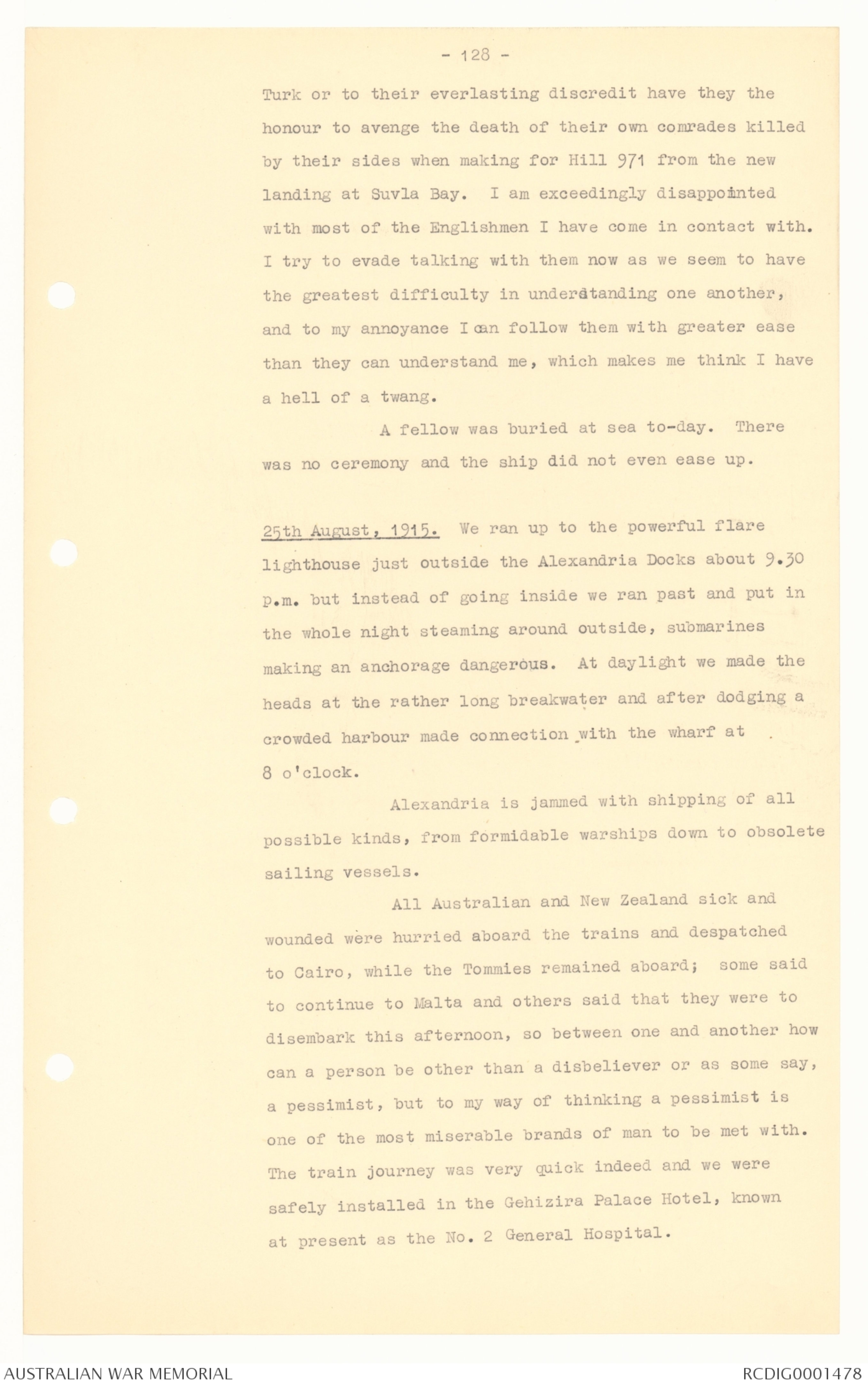
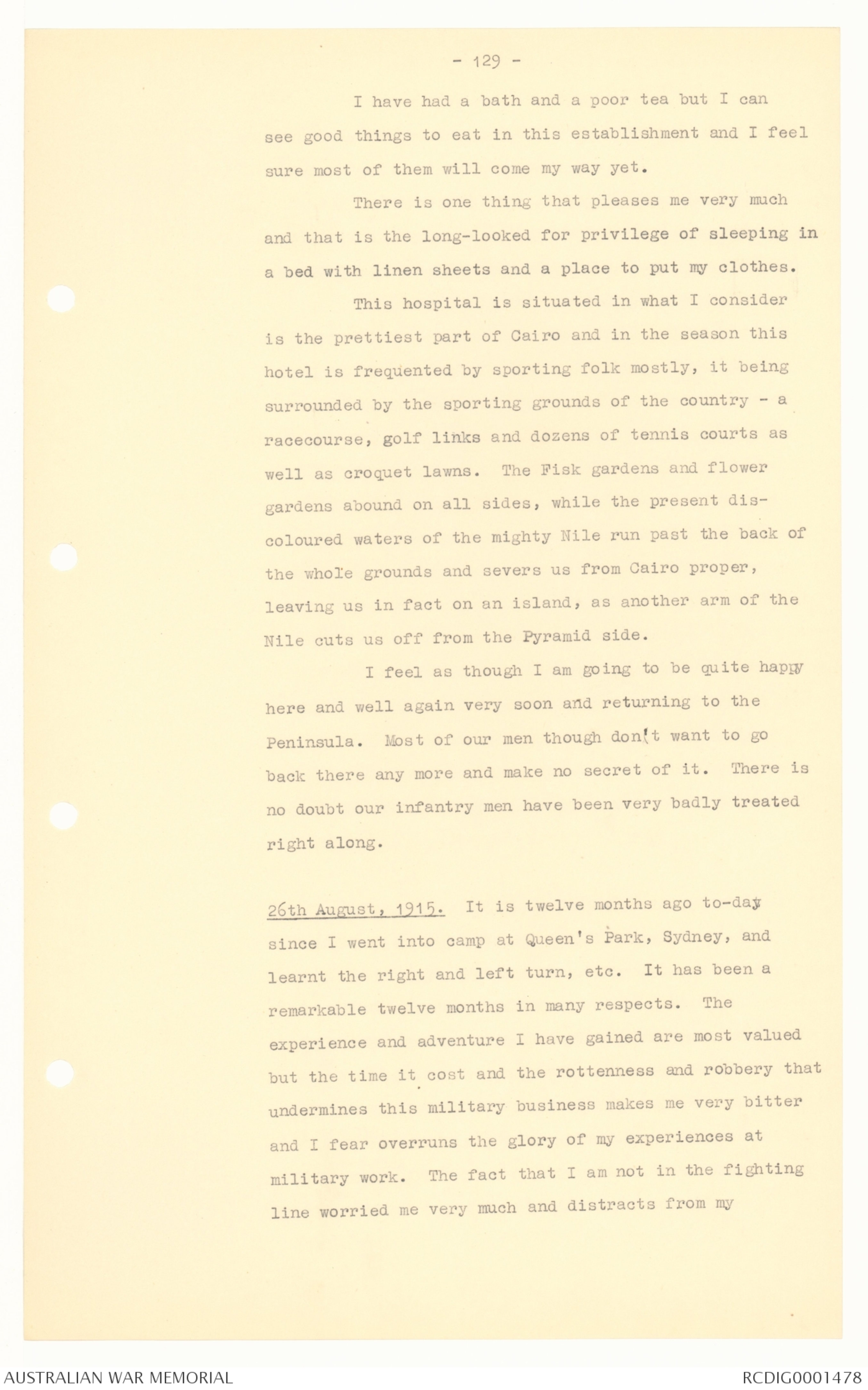
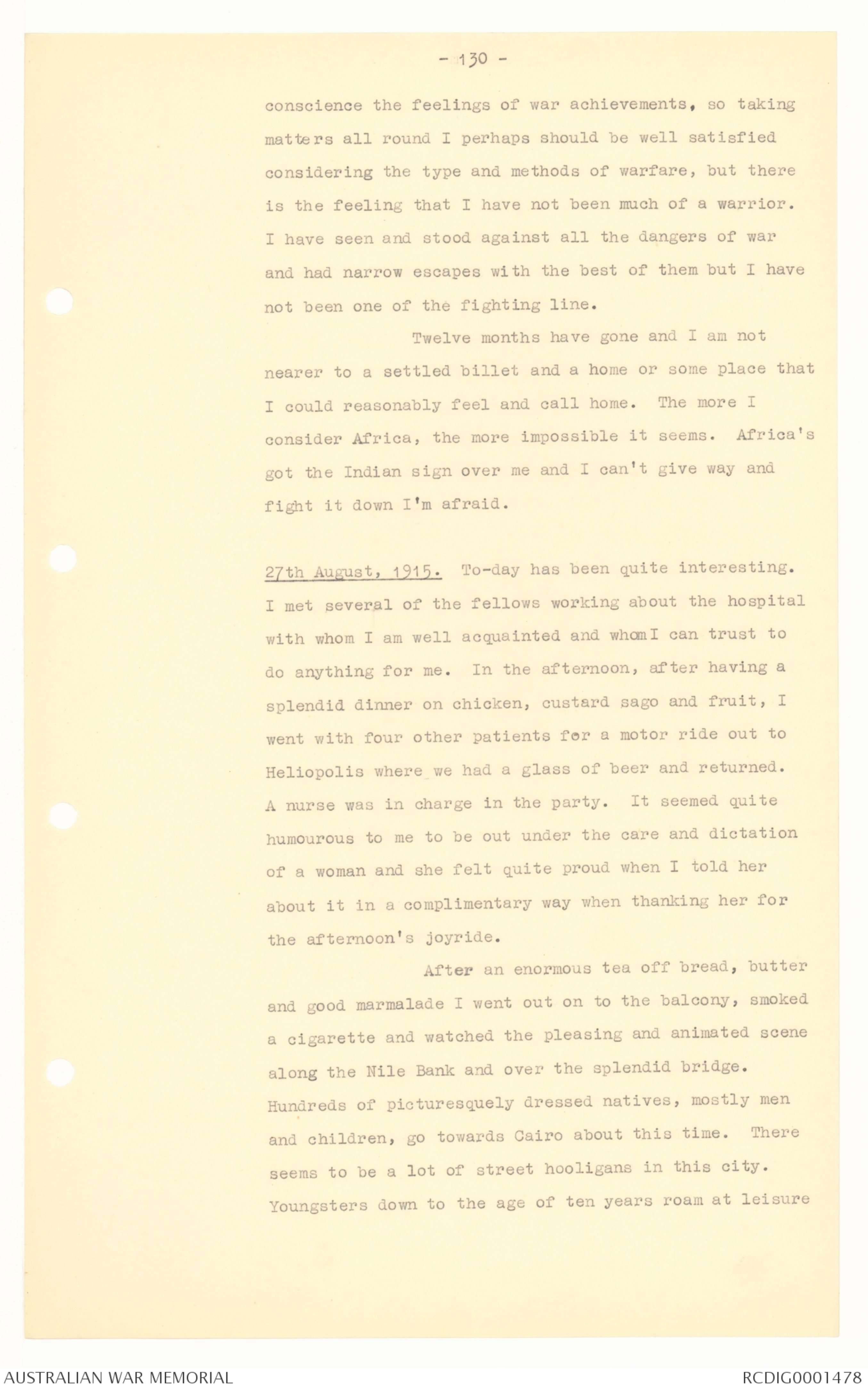
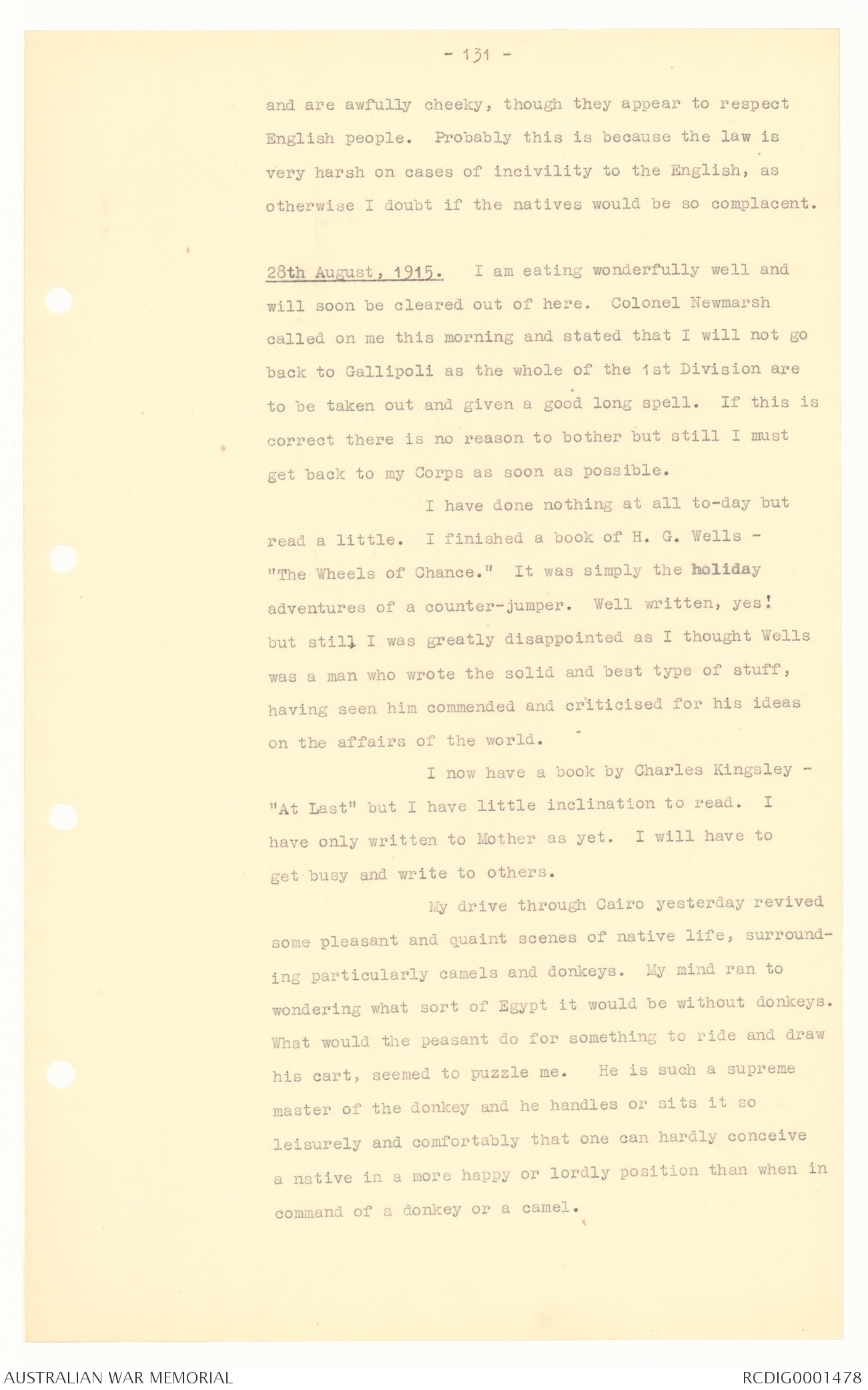
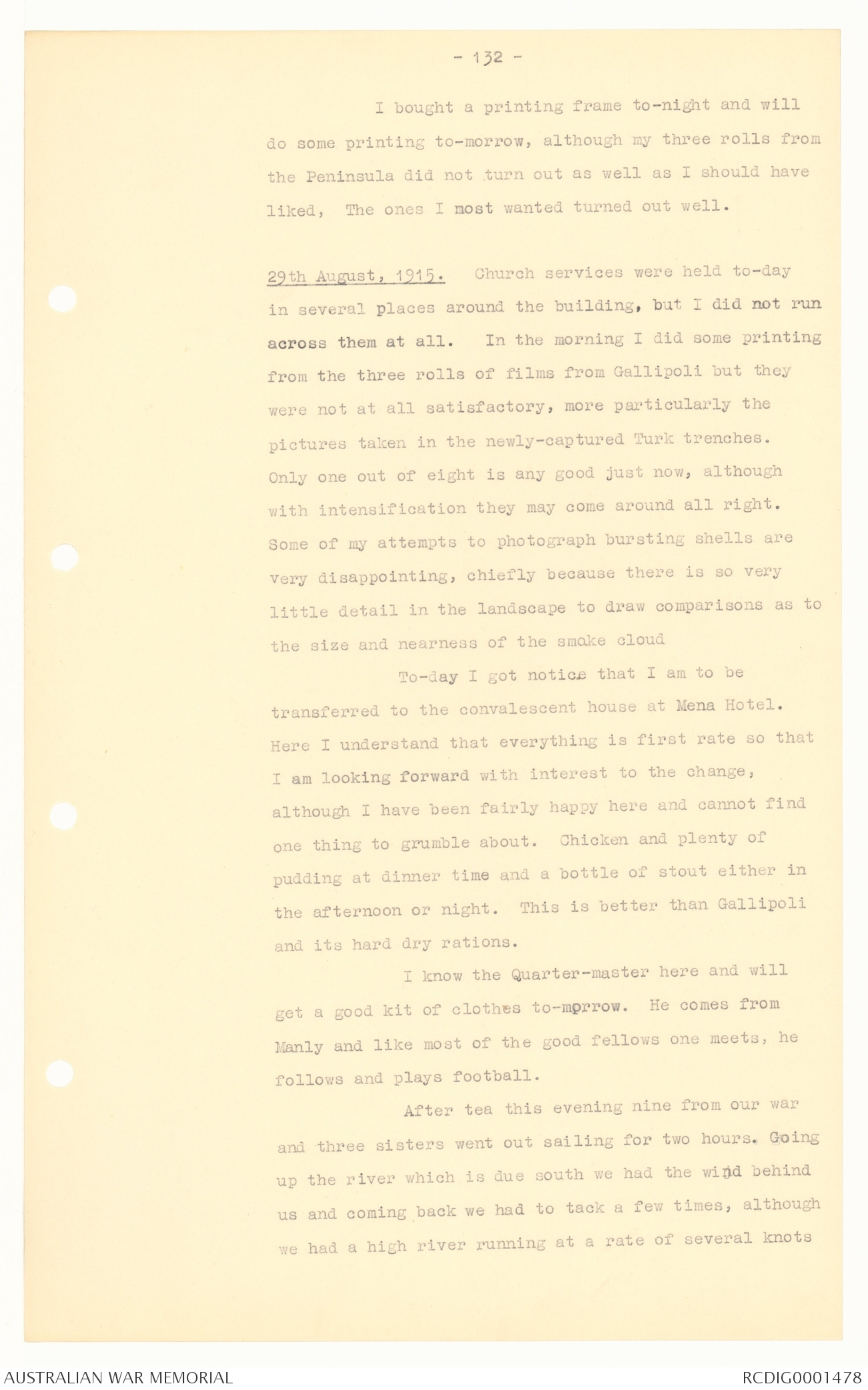
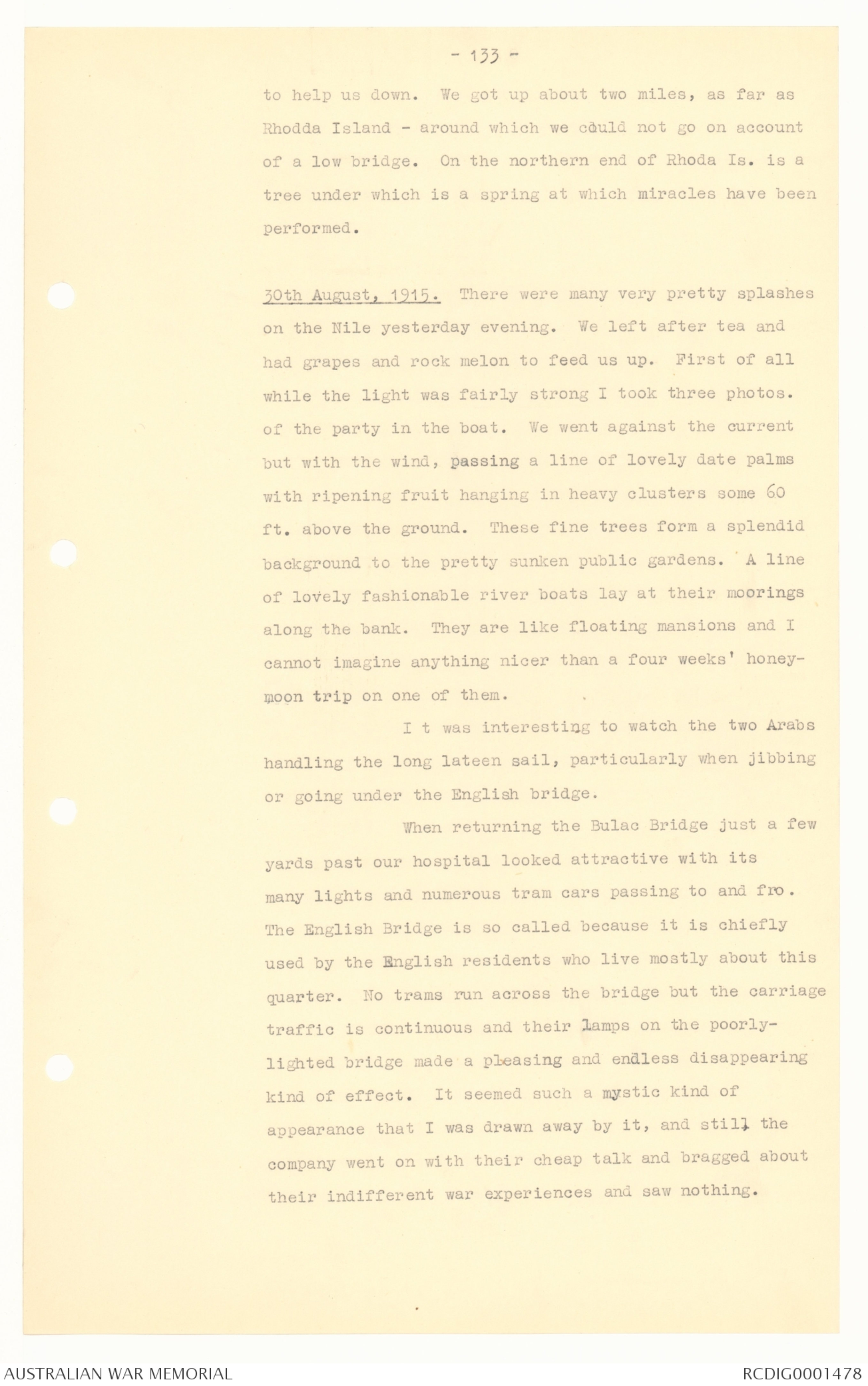
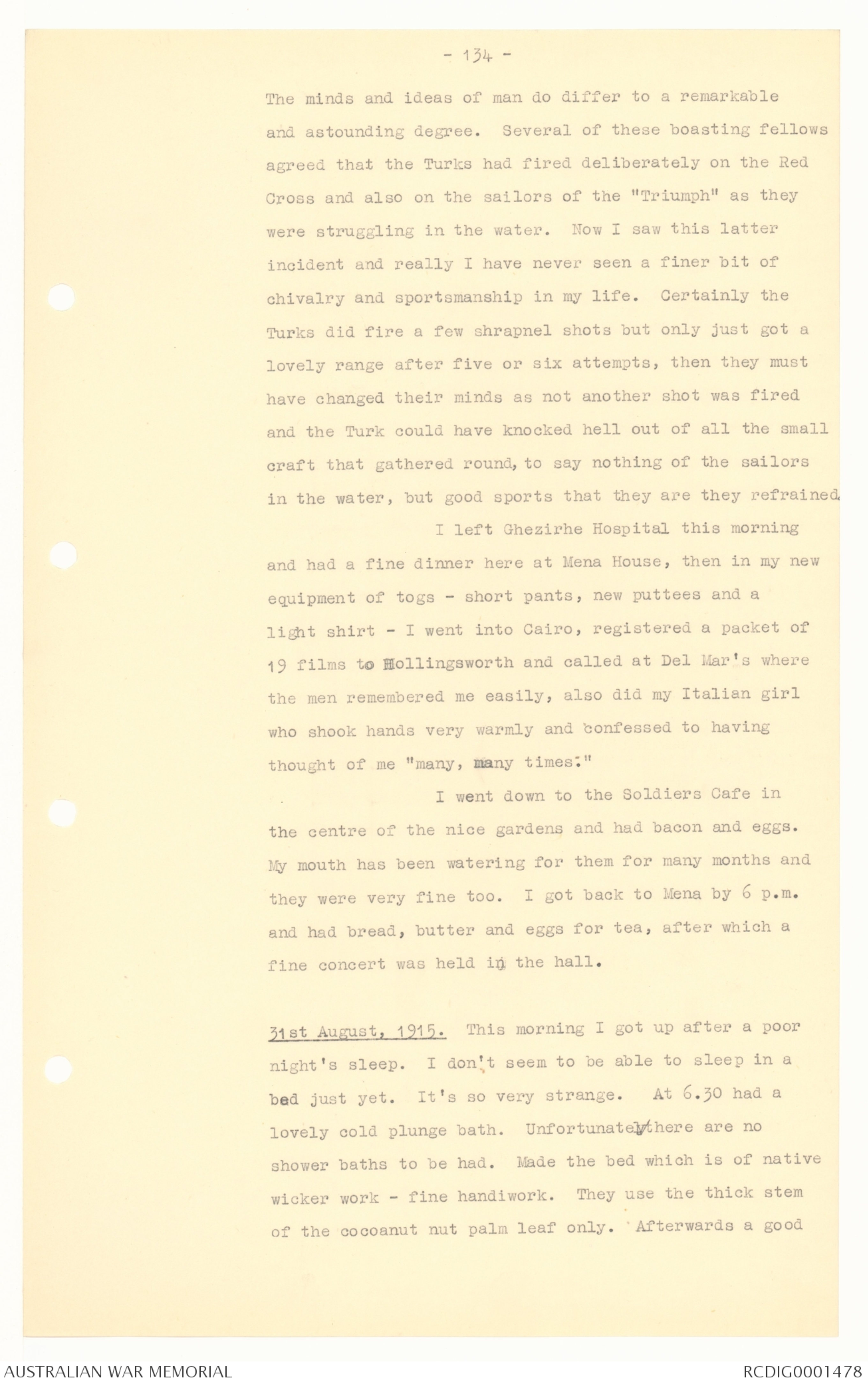
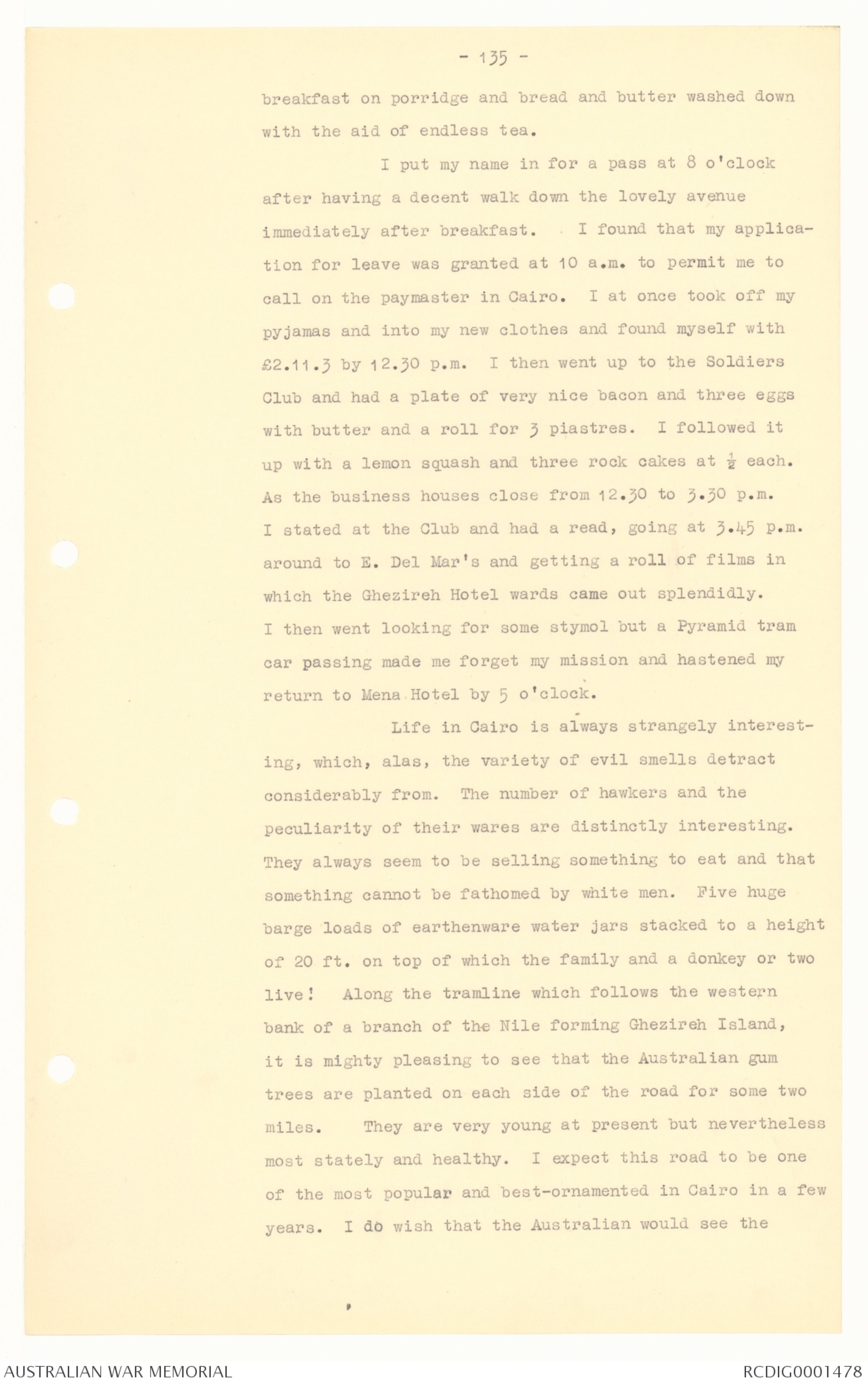
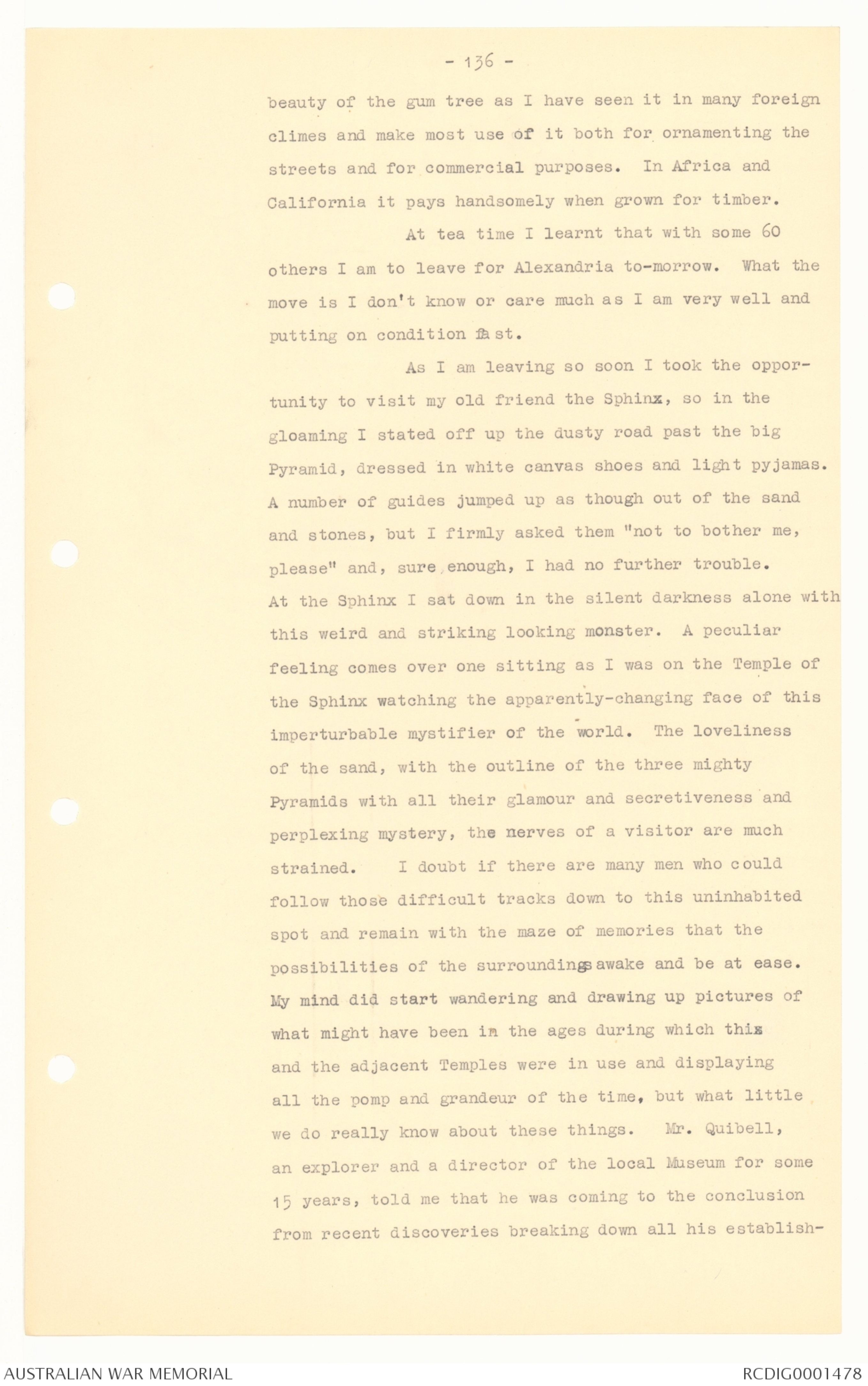
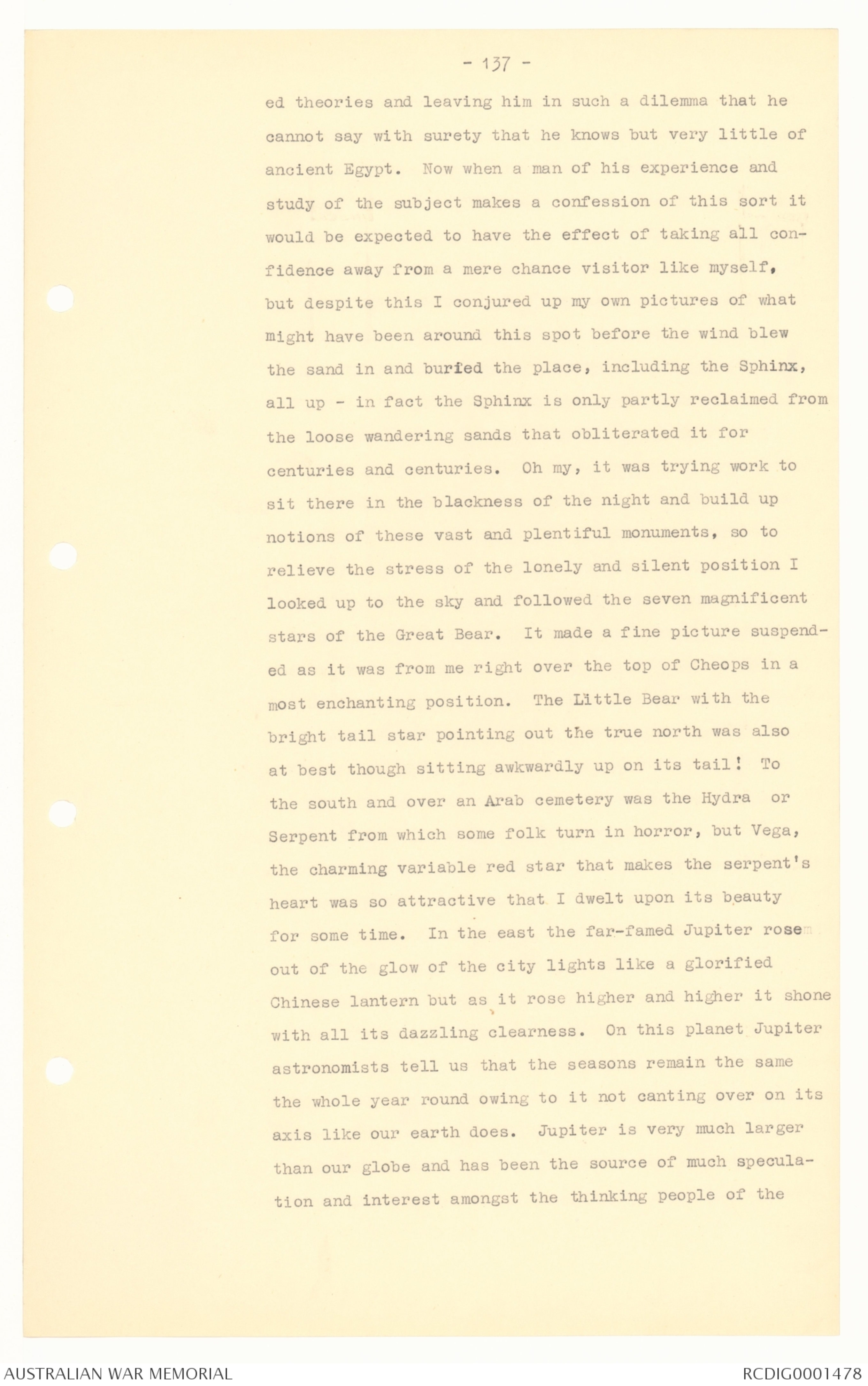
- 128 -
Turk or to their everlasting discredit have they the
honour to avenge the death of their own comrades killed
by their sides when making for Hill 971 from the new
landing at Suvla Bay. I am exceedingly disappointed
with most of the Englishmen I have come in contact with.
I try to evade talking with them now as we seem to have
the greatest difficulty in understanding one another,
and to my annoyance I can follow them with greater ease
than they can understand me, which makes me think I have
a hell of a twang.
A fellow was buried at sea to-day. There
was no ceremony and the ship did not even ease up.
25th August, 1915. We ran up to the powerful flare
lighthouse just outside the Alexandria Docks about 9.30
p.m. but instead of going inside we ran past and put in
the whole night steaming around outside, submarines
making an anchorage dangerous. At daylight we made the
heads at the rather long breakwater and after dodging a
crowded harbour made connection with the wharf at
8 o'clock.
Alexandria is jammed with shipping of all
possible kinds, from formidable warships down to obsolete
sailing vessels.
All Australian and New Zealand sick and
wounded were hurried aboard the trains and despatched
to Cairo, while the Tommies remained aboard; some said
to continue to Malta and others said that they were to
disembark this afternoon, so between one and another how
can a person be other than a disbeliever or as some say,
a pessimist, but to my way of thinking a pessimist is
one of the most miserable brands of man to be met with.
The train journey was very quick indeed and we were
safely installed in the Gehizira Palace Hotel, known
at present as the No. 2 General Hospital.
- 129 -
I have had a bath and a poor tea but I can
see good things to eat in this establishment and I feel
sure most of them will come my way yet.
There is one thing that pleases me very much
and that is the long-looked for privilege of sleeping in
a bed with linen sheets and a place to put my clothes.
This hospital is situated in what I consider
is the prettiest part of Cairo and in the season this
hotel is frequented by sporting folk mostly, it being
surrounded by the sporting grounds of the country - a
racecourse, golf links and dozens of tennis courts as
well as croquet lawns. The Fisk gardens and flower
gardens abound on all sides, while the present discoloured
waters of the mighty Nile run past the back of
the whole grounds and severs us from Cairo proper,
leaving us in fact on an island, as another arm of the
Nile cuts us off from the Pyramid side.
I feel as though I am going to be quite happy
here and well again very soon and returning to the
Peninsula. Most of our men though don't want to go
back there any more and make no secret of it. There is
no doubt our infantry men have been very badly treated
right along.
26th August, 1915. It is twelve months ago to-day
since I went into camp at Queen's Park, Sydney, and
learnt the right and left turn, etc. It has been a
remarkable twelve months in many respects. The
experience and adventure I have gained are most valued
but the time it cost and the rottenness and robbery that
undermines this military business makes me very bitter
and I fear overruns the glory of my experiences at
military work. The fact that I am not in the fighting
line worried me very much and distracts from my
- 130 -
conscience the feelings of war achievements, so taking
matters all round I perhaps should be well satisfied
considering the type and methods of warfare, but there
is the feeling that I have not been much of a warrior.
I have seen and stood against all the dangers of war
and had narrow escapes with the best of them but I have
not been one of the fighting line.
Twelve months have gone and I am not
nearer to a settled billet and a home or some place that
I could reasonably feel and call home. The more I
consider Africa, the more impossible it seems. Africa's
got the Indian sign over me and I can’t give way and
fight it down I'm afraid.
27th August, 1915. To-day has been quite interesting.
I met several of the fellows working about the hospital
with whom I am well acquainted and whom I can trust to
do anything for me. In the afternoon, after having a
splendid dinner on chicken, custard sago and fruit, I
went with four other patients for a motor ride out to
Heliopolis where we had a glass of beer and returned.
A nurse was in charge in the party. It seemed quite
humourous to me to be out under the care and dictation
of a woman and she felt quite proud when I told her
about it in a complimentary way when thanking her for
the afternoon's joyride.
After an enormous tea off bread, butter
and good marmalade I went out on to the balcony, smoked
a cigarette and watched the pleasing and animated scene
along the Nile Bank and over the splendid bridge.
Hundreds of picturesquely dressed natives, mostly men
and children, go towards Cairo about this time. There
seems to be a lot of street hooligans in this city.
Youngsters down to the age of ten years roam at leisure
- 131 -
and are awfully cheeky, though they appear to respect
English people. Probably this is because the law is
very harsh on cases of incivility to the English, as
otherwise I doubt if the natives would be so complacent.
28th August, 1915. I am eating wonderfully well and
will soon be cleared out of here. Colonel Newmarsh
called on me this morning and stated that I will not go
back to Gallipoli as the whole of the 1st Division are
to be taken out and given a good long spell. If this is
correct there is no reason to bother but still I must
get back to my Corps as soon as possible.
I have done nothing at all to-day but
read a little. I finished a book of H. G. Wells -
"The Wheels of Chance." It was simply the holiday
adventures of a counter-jumper. Well written, yes!
but still I was greatly disappointed as I thought Wells
was a man who wrote the solid and best type of stuff,
having seen him commended and criticised for his ideas
on the affairs of the world.
I now have a book by Charles Kingsley -
"At Last" but I have little inclination to read. I
have only written to Mother as yet. I will have to
get busy and write to others.
My drive through Cairo yesterday revived
some pleasant and quaint scenes of native life, surrounding
particularly camels and donkeys. My mind ran to
wondering what sort of Egypt it would be without donkeys.
What would the peasant do for something to ride and draw
his cart, seemed to puzzle me. He is such a supreme
master of the donkey and he handles or sits it so
leisurely and comfortably that one can hardly conceive
a native in a more happy or lordly position than when in
command of a donkey or a camel.
- 132 -
I bought a printing frame to-night and will
do some printing to-morrow, although my three rolls from
the Peninsula did not turn out as well as I should have
liked, The ones I most wanted turned out well.
29th August, 1915. Church services were held to-day
in several places around the building, but I did not run
across them at all. In the morning I did some printing
from the three rolls of films from Gallipoli but they
were not at all satisfactory, more particularly the
pictures taken in the newly-captured Turk trenches.
Only one out of eight is any good just now, although
with intensification they may come around all right.
Some of my attempts to photograph bursting shells are
very disappointing, chiefly because there is so very
little detail in the landscape to draw comparisons as to
the size and nearness of the smoke cloud
To-day I got notice that I am to be
transferred to the convalescent house at Mena Hotel.
Here I understand that everything is first rate so that
I am looking forward with interest to the change,
although I have been fairly happy here and cannot find
one thing to grumble about. Chicken and plenty of
pudding at dinner time and a bottle of stout either in
the afternoon or night. This is better than Gallipoli
and its hard dry rations.
I know the Quarter-master here and will
get a good kit of clothes to-morrow. He comes from
Manly and like most of the good fellows one meets, he
follows and plays football.
After tea this evening nine from our war
and three sisters went out sailing for two hours. Going
up the river which is due south we had the wind behind
us and coming back we had to tack a few times, although
we had high river running at a rate of several knots
- 133 -
to help us down. We got up about two miles, as far as
Rhodda Island - around which we could not go on account
of a low bridge. On the northern end of Rhoda Is. is a
tree under which is a spring at which miracles have been
performed.
30th August, 1915. There were many very pretty splashes
on the Nile yesterday evening. We left after tea and
had grapes and rock melon to feed us up. First of all
while the light was fairly strong I took three photos.
of the party in the boat. We went against the current
but with the wind, passing a line of lovely date palms
with ripening fruit hanging in heavy clusters some 60
ft. above the ground. These fine trees form a splendid
background to the pretty sunken public gardens. A line
of lovely fashionable river boats lay at their moorings
along the bank. They are like floating mansions and I
cannot imagine anything nicer than a four weeks' honeymoon
trip on one of them.
It was interesting to watch the two Arabs
handling the long lateen sail, particularly when jibbing
or going under the English bridge.
When returning the Bulac Bridge just a few
yards past our hospital looked attractive with its
many lights and numerous tram cars passing to and fro.
The English Bridge is so called because it is chiefly
used by the English residents who live mostly about this
quarter. No trams run across the bridge but the carriage
traffic is continuous and their lamps on the poorly-lighted
bridge made a pleasing and endless disappearing
kind of effect. It seemed such a mystic kind of
appearance that I was drawn away by it, and still the
company went on with their cheap talk and bragged about
their indifferent war experiences and saw nothing.
- 134 -
The minds and ideas of man do differ to a remarkable
and astounding degree. Several of these boasting fellows
agreed that the Turks had fired deliberately on the Red
Cross and also on the sailors of the "Triumph" as they
were struggling in the water. Now I saw this latter
incident and really I have never seen a finer bit of
chivalry and sportsmanship in my life. Certainly the
Turks did fire a few shrapnel shots but only just got a
lovely range after five or six attempts, then they must
have changed their minds as not another shot was fired
and the Turk could have knocked hell out of all the small
craft that gathered round, to say nothing of the sailors
in the water, but good sports that they are they refrained.
I left Ghezirhe Hospital this morning
and had a fine dinner here at Mena House, then in my new
equipment of togs - short pants, new puttees and a
light shirt - I went into Cairo, registered a packet of
19 films to Hollingsworth and called at Del Mar's where
the men remembered me easily, also did my Italian girl
who shook hands very warmly and confessed to having
thought of me "many, many times."
I went down to the Soldiers Cafe in
the centre of the nice gardens and had bacon and eggs.
My mouth has been watering for them for many months and
they were very fine too. I got back to Mena by 6 p.m.
and had bread, butter and eggs for tea, after which a
fine concert was held in the hall.
31st August, 1915. This morning I got up after a poor
night's sleep. I don't seem to be able to sleep in a
bed just yet. It's so very strange. At 6.30 had a
lovely cold plunge bath. Unfortunately/there are no
shower baths to be had. Made the bed which is of native
wicker work - fine handiwork. They use the thick stem
of the cocoanut nut palm leaf only. Afterwards a good
- 135 -
breakfast on porridge and bread and butter washed down
with the aid of endless tea.
I put my name in for a pass at 8 o'clock
after having a decent walk down the lovely avenue
immediately after breakfast. I found that my application
for leave was granted at 10 a.m. to permit me to
call on the paymaster in Cairo. I at once took off my
pyjamas and into my new clothes and found myself with
£2.11.3 by 12.30 p.m. I then went up to the Soldiers
Club and had a plate of very nice bacon and three eggs
with butter and a roll for 3 piastres. I followed it
up with a lemon squash and three rock cakes at ½ each.
As the business houses close from 12.30 to 3.30 p.m.
I stated at the Club and had a read, going at 3.45 p.m.
around to E. Del Mar's and getting a roll of films in
which the Ghezireh Hotel wards came out splendidly.
I then went looking for some stymol but a Pyramid tram
car passing made me forget my mission and hastened my
return to Mena Hotel by 5 o'clock.
Life in Cairo is always strangely interesting,
which, alas, the variety of evil smells detract
considerably from. The number of hawkers and the
peculiarity of their wares are distinctly interesting.
They always seem to be selling something to eat and that
something cannot be fathomed by white men. Five huge
barge loads of earthenware water jars stacked to a height
of 20 ft. on top of which the family and a donkey or two
live! Along the tramline which follows the western
bank of a branch of the Nile forming Ghezireh Island,
it is mighty pleasing to see that the Australian gum
trees are planted on each side of the road for some two
miles. They are very young at present but nevertheless
most stately and healthy. I expect this road to be one
of the most popular and best-ornamented in Cairo in a few
years. I do wish that the Australian would see the
- 136 -
beauty of the gum tree as I have seen it in many foreign
climes and make most use of it both for ornamenting the
streets and for commercial purposes. In Africa and
California it pays handsomely when grown for timber.
At tea time I learnt that with some 60
others I am to leave for Alexandria to-morrow. What the
move is I don't know or care much as I am very well and
putting on condition fast.
As I am leaving so soon I took the opportunity
to visit my old friend the Sphinx, so in the
gloaming I stated off up the dusty road past the big
Pyramid, dressed in white canvas shoes and light pyjamas.
A number of guides jumped up as though out of the sand
and stones, but I firmly asked them "not to bother me,
please" and, sure enough, I had no further trouble.
At the Sphinx I sat down in the silent darkness alone with
this weird and striking looking monster. A peculiar
feeling comes over one sitting as I was on the Temple of
the Sphinx watching the apparently-changing face of this
imperturbable mystifier of the world. The loveliness
of the sand, with the outline of the three mighty
Pyramids with all their glamour and secretiveness and
perplexing mystery, the nerves of a visitor are much
strained. I doubt if there are many men who could
follow those difficult tracks down to this uninhabited
spot and remain with the maze of memories that the
possibilities of the surroundings awake and be at ease.
My mind did start wandering and drawing up pictures of
what might have been in the ages during which this
and the adjacent Temples were in use and displaying
all the pomp and grandeur of the time, but what little
we do really know about these things. Mr. Quibell,
an explorer and a director of the local Museum for some
15 years, told me that he was coming to the conclusion
from recent discoveries breaking down all his established
- 137 -
theories and leaving him in such a dilemma that he
cannot say with surety that he knows but very little of
ancient Egypt. Now when a man of his experience and
study of the subject makes a confession of this sort it
would be expected to have the effect of taking all
confidence away from a mere chance visitor like myself,
but despite this I conjured up my own pictures of what
might have been around this spot before the wind blew
the sand in and buried the place, including the Sphinx,
all up - in fact the Sphinx is only partly reclaimed from
the loose wandering sands that obliterated it for
centuries and centuries. Oh my, it was trying work to
sit there in the blackness of the night and build up
notions of these vast and plentiful monuments, so to
relieve the stress of the lonely and silent position I
looked up to the sky and followed the seven magnificent
stars of the Great Bear. It made a fine picture suspended
as it was from me right over the top of Cheops in a
most enchanting position. The Little Bear with the
bright tail star pointing out the true north was also
at best though sitting awkwardly up on its tail! To
the south and over an Arab cemetery was the Hydra or
Serpent from which some folk turn in horror, but Vega,
the charming variable red star that makes the serpent's
heart was so attractive that I dwelt upon its beauty
for some time. In the east the far-famed Jupiter rose
out of the glow of the city lights like a glorified
Chinese lantern but as it rose higher and higher it shone
with all its dazzling clearness. On this planet Jupiter
astronomists tell us that the seasons remain the same
the whole year round owing to it not canting over on its
axis like our earth does. Jupiter is very much larger
than our globe and has been the source of much speculation
and interest amongst the thinking people of the
 Loretta Corbett
Loretta CorbettThis transcription item is now locked to you for editing. To release the lock either Save your changes or Cancel.
This lock will be automatically released after 60 minutes of inactivity.